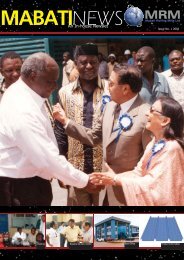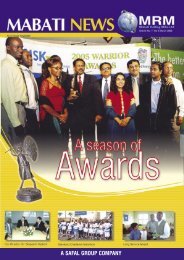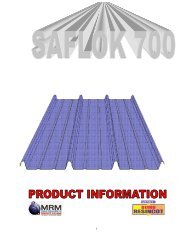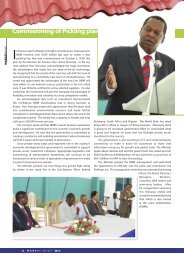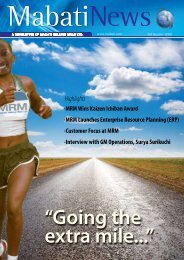Create successful ePaper yourself
Turn your PDF publications into a flip-book with our unique Google optimized e-Paper software.
THE LAUNCH OF SAFAL, HORN OF AFRICA REGION<br />
MABATINEWS<br />
Amid pomp and fireworks, SAFAL Group<br />
was officially launched on the 26th of<br />
October, 2006 in a colourful ceremony<br />
in Nairobi. In attendance were both local and<br />
foreign guests. The unveiling ceremony was<br />
carried out by Dr Manu Chandaria, Chairman<br />
of the Comcraft Group of Companies,<br />
accompanied by his wife Aruna, and<br />
Mr. D.P. Shah, Senior Director, together<br />
with his wife.<br />
SAFAL incorporates four clusters<br />
mainly Horn of Africa region, Great<br />
Lakes Region, Southern Africa and<br />
South Africa. The Great Lakes Region<br />
launch was carried out in August 2006,<br />
in Kampala.<br />
SAFAL Horn of Africa region includes<br />
<strong>Mabati</strong> <strong>Rolling</strong> <strong>Mills</strong> Ltd., Athi River,<br />
Nairobi and Mariakani, Insteel Limited<br />
and Ethiopian Steel PLC. Mr. Kaushik<br />
Shah is the CEO. In his welcoming<br />
address, he had the following message<br />
to share:<br />
“In today’s business environment,<br />
more than at any one time in history,<br />
the only constant is change. Markets,<br />
Products, Technology and Competitive<br />
Conditions are rapidly changing ... What this<br />
means for us and, indeed for all organizations,<br />
is that we must possess the capacity and<br />
goodwill to adapt to these changes effectively.<br />
Indeed, any organization, large or small, that<br />
fails to change could pay a very heavy cost,<br />
which could impact on its very survival!<br />
On the other hand, organizations that<br />
effectively manage change by continuously<br />
adapting their bureaucracies, strategies,<br />
systems, products and cultures to survive<br />
the shocks of change; should benefit and<br />
prosper.<br />
Reality today is that leaders and managers<br />
MUST become Masters of Change and<br />
Renewal to effectively lead their organizations<br />
to greater levels. Those who do not will<br />
continue to struggle.<br />
Tonight, Ladies and Gentlemen, we will be<br />
celebrating the results of our organizations’<br />
renewal … As my role was to welcome you, I<br />
will not delve into the details of this important<br />
step that we have taken.”<br />
Mr. Sarit Shah, Director for South and<br />
Southern Africa Region, took the audience<br />
through the genesis, current state and future<br />
of SAFAL.<br />
Dr. Manu Chandaria, in his usual jovial<br />
mood, gave an inspiring address, highlights<br />
of which are reproduced here:<br />
“The recent World Bank report<br />
on Africa says that Africa is listed<br />
as the most difficult place in the<br />
world to do business. However<br />
there are lots of opportunities<br />
and some of the companies are<br />
doing extremely well in spite of<br />
all the problems of insecurity,<br />
famine, HIV/aids and difficult<br />
political situations. All of us<br />
who are here know all this and<br />
yet we are running successful<br />
businesses. This is largely due to<br />
our commitment, dedication and<br />
hard work. SAFAL is no exception.<br />
Thanks to all of you for your support<br />
to us, the SAFAL Group is now in a number<br />
of countries in eastern Africa and southern<br />
Africa and hope it will have its presence<br />
in many more countries in Africa. In my<br />
various speeches I keep on addressing the<br />
government that Kenya’s best resource is<br />
its human resource - its professionals and,<br />
above all, its entrepreneurs. Our workforce<br />
can be quickly trained and our professionals<br />
are equally a brand on their own not only<br />
in Kenya but also in many African countries<br />
and in Europe and the United States. Our<br />
entrepreneurs are second to none. They are<br />
not only entrepreneurs of Kenya but also<br />
of the region. Today our world<br />
is a global village;<br />
it's global<br />
in nature, it's global in<br />
manufacturing, it's global in<br />
trading, its global in services.<br />
Under these circumstances<br />
economies like China, India,<br />
Brazil and Russia are going to<br />
compete for the same Kenya<br />
shillings or any other African<br />
currencies which are in the<br />
pockets of our people. Today’s<br />
trend is that they are out to invest<br />
in Africa for natural resources<br />
and, against that, they will flood<br />
the markets of Africa with goods<br />
which are manufactured in their<br />
countries. Because of the scale<br />
of manufacturing, they are cheaper than ours.<br />
This onslaught is going to upset a number<br />
of economies unless we all get together and<br />
continue to keep our markets and propagate<br />
“made in Africa” as our first responsibility and<br />
keep jobs of our people and our children. This<br />
will require a lot of Africanness.<br />
Today in Kenya we are seeing a period<br />
of turbulent politics; but we are also seeing<br />
M A B A T I N E W S<br />
3



